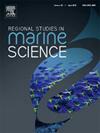Exploring the sustainable development mode of marine aquaculture in China – From the perspective of water footprint
IF 2.4
4区 环境科学与生态学
Q3 ECOLOGY
引用次数: 0
Abstract
As China has turned its attention to marine fisheries, the field of marine aquaculture has experienced rapid development. However, the unregulated growth of aquaculture and the misuse of feed have reduced the efficiency of China's aquaculture sector, thereby hindering the sustainable development of its marine fisheries. This study aims to explore the sustainable development mode of marine aquaculture from a water footprint perspective and further examine the impacts of international trade and food self-sufficiency on China's marine fisheries and environment. The results showed that the cage aquaculture water footprint was the highest, reaching a staggering 110.1 m3/kg, followed by pond and industrial aquaculture. By reducing cage aquaculture production, encouraging industrial aquaculture, and increasing the production of low-water-footprint and high-profit aquatic products such as shrimp and crab can increase yields (23.4 %), profit (36.1 %), and the protein supply (18.9 %) of marine aquaculture, reducing the total water footprint by 14.5 %.
中国海洋水产养殖可持续发展模式探索——基于水足迹的视角
随着中国对海洋渔业的重视,海洋水产养殖领域得到了快速发展。然而,水产养殖的无管制增长和饲料的滥用降低了中国水产养殖部门的效率,从而阻碍了中国海洋渔业的可持续发展。本研究旨在从水足迹视角探索海洋水产养殖的可持续发展模式,并进一步考察国际贸易和粮食自给对中国海洋渔业和环境的影响。结果表明,网箱养殖的水足迹最高,达到惊人的110.1 m3/kg,其次是池塘养殖和工业养殖。通过减少网箱养殖产量,鼓励工业化养殖,增加虾蟹等低水足迹和高利润水产品的生产,可提高海洋养殖产量(23.4% %)、利润(36.1% %)和蛋白质供应(18.9 %),减少总水足迹14. %。
本文章由计算机程序翻译,如有差异,请以英文原文为准。
求助全文
约1分钟内获得全文
求助全文
来源期刊

Regional Studies in Marine Science
Agricultural and Biological Sciences-Ecology, Evolution, Behavior and Systematics
CiteScore
3.90
自引率
4.80%
发文量
336
审稿时长
69 days
期刊介绍:
REGIONAL STUDIES IN MARINE SCIENCE will publish scientifically sound papers on regional aspects of maritime and marine resources in estuaries, coastal zones, continental shelf, the seas and oceans.
 求助内容:
求助内容: 应助结果提醒方式:
应助结果提醒方式:


